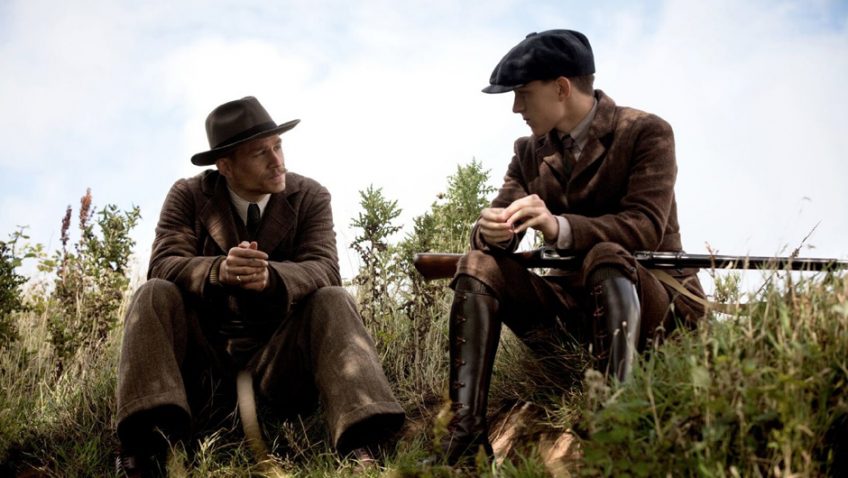Robert Tanitch reviews the latest DVDs
Westfront 1918 (Eureka). G. W. Pabst’s great anti-war film, released in 1930, is World War 1 from the German point of view. It deserves to be far better known than it is. No heroics, morale permanently low, it feels authentic. The staging of the battle scenes is staged with brilliant economy. The camera does not flinch from the carnage. Pabst, a great and underrated director, observes the soldiers (cannon fodder) in the trenches suffering friendly fire and the civilians starving back home. A soldier returns to find his wife in bed with the local butcher. It’s the only way she can get food.
Kameradschaft (Eureka) olso deserves to be better known A coal mine, which crosses the border between Germany and France, is on fire on the French side. The German miners, putting aside 100 years of animosity between the two nations, come to the rescue of the trapped French miners. Pabst’s bi-lingual 1931 film, set in the immediate aftermath of world War 1 (seen in flashback, man to man fighting) is a moving recreation of a mining disaster based on a real disaster which happened in 1906. Pabst’s masterly handling of the large crowds gathered outside the gates and his handling of the miners in the collapsing mine have a documentary authenticity.
J’accuse (BFI) released in 1938 was billed by Abel Gance, a passionate pacifist, as “a tragic picture of modern times and dedicated to the dead of the next war.” This film is notable for is vivid war scenes. A patrol is sent to its certain and pointless death on the very last day of World War 1. The film ends memorably with a veteran of the war, driven mad by the horrors he had seen at Verdun, begging the 9 million war dead to rise from their graves and prevent, stop, and abolish war forever. Gance’s powerful warning fell on deaf ears in 1938.
The Fabulous Baron Munchausen (Second Run). Munchausen riding a cannon ball flying through the sky is an iconic image. His name is forever synonymous with the preposterous. There have been so many films about the Baron and his outrageous lies. The best remains Karel Zeman’s 1961 film, a Czech classic, inspired by Gustave Dore and Georges Melies and highly influential to Terry Gilliam and Tim Burton. The fairy tale is given the full fantastical treatment. The inventive and witty tableaux are a constant pleasure.
Der Müde Tod (Eureka). Anybody interested in the career of Fritz Lang will want to see this very early (1921) silent film, a folk tale in six verses. A young woman’s fiancé dies. She bargains with Death for his life. Can she save him? Is love stronger than death? Death gives her three fairy tale tasks set in three different places and in three different eras. There are cartoonish caricatures and tableaux of Baghdad (Arabian Nights), Venice (Renaissance melodrama) and Imperial China (childlike magic and humour). The Grim Reaper (Bernhard Goetzke, an impressive presence) is invincible and the only way to beat him is to join him.
Peppermint Soda (BFI). Diane Kurys says her autobiographical and therapeutic film is aimed at all those women who were 13, 14, 15-year-old schoolgirls in the 1960’s. Adolescence is not easy. The episodes will resonate with anybody who had an unhappy childhood and was taught by ghastly teachers (here mercilessly caricatured). Kurys’ truthfulness ensured its big success in France on its release in 1977. The emotional high spot is one girl’s long, calm account of the Charonne demonstrations, the police brutality and the funerals afterwards.
The Lost City Of Z (StudioCanal). Lt Colonel Percy Fawcett in the early part of the 20th century was the most famous explorer in the world. He was convinced there was a lost civilisation in the uncharted jungle of Bolivia. James Gray’s epic film charts his obsession and dangerous commission. Charlie Hunnam acts with British stiff-upper-lip understatement. He appeases the natives, who are bombarding him with arrows, by singing the national anthem. Fawcett was said to be the inspiration for Indiana Jones; but Gray and Hunnan in eschewing all Boys’ Own heroic adventures, never quite measure up to Conrad’s Heart of Darkness and Aguirre Wrath of God potential.
The Orchard End Murder (BFI). A young woman (Tracy Hyde), bored watching her boy friend playing cricket, wanders off into the orchard. She meets a weird railway gatekeeper (Bill Wallis), a hunchback, gnome-freak, who invites her to have tea. She also meets a simple-minded railway worker (Clive Mantle) who murders her and buries her naked body under a pile of apples. This short (48 minutes) oddity, which has not been seen since 1970, feels amateurish and not really worth re-releasing.
To learn more about Robert Tanitch and his reviews, click here to go to his website











